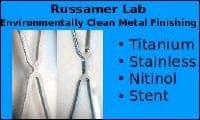
Curated with aloha by
Ted Mooney, P.E. RET

The authoritative public forum
for Metal Finishing 1989-2025

-----
Stainless Steel Acid Cleaner Required
Q. Hi
I am a fabrication foreman who works in a family owned business which specializes in stainless steel fabrication. We typically make parts for the food industry but also carry out lots of factory breakdowns i.e., welding and machining work. At the moment the finishing we use is very limited, hand pickling and shot blasting.
My question is this, I am looking for an acid cleaner that will remove any foreign material and leave the part clean to a high standard if say for instance it was left soaking in it overnight ?
Chris Scott-Bristol, England U.K
2001
A. Chris,
The Type of product you may be looking for is quite difficult to match exactly. Cleaners for Stainless Steel are commonly acid based but vary in composition depending upon the type of soil that is to be removed.
There are several different "brews" for different cleaning problems, including pickling gels for the general clean-up of stainless. Such gels can cope very well with removing both welding oxides/spattering and heat staining from joints, etc. Other products are available to allow an overnight soak as you suggested. We would need more info however to give a more definitive answer to your question.
John Sutton- Preston Lancs, UK
2001
|
|
2001 Hi there we use a cleaner to remove marks of our steel parts. The only problem being - to remove marks adequately from the surface the cleaner needs heated to approx. 40 degrees. The name of the supplier is Henkel and the product is Novaclean. But I am sure you can get a similar product from any chemical supplier. Hope you get what you are looking for. Regards, Lisa Lisa Wallace- Belfast Q. Thanks for your reply John I list below the requested info: At the moment we do indeed use the picking gel you refer to but I tend to find that after applying for the correct period of time & then removing you always tend to get a mark where the picking paste was . This can be removed with an abrasive but its time consuming and usually to get an even finish we have to coat the complete product in it. What I really am after is a process that's relatively cheap to set up that will when used will leave the product free of heat marks , welding oxides & general foreign matter like dirty finger prints and also have a fairly good shine on it .This product doesn't have to be left overnight in fact the quicker the better .I am to all intents and purposes a beginner in this field and may be looking for a product that doesn't exist ,I hope you can help Cheers chris scott [returning]- bristol, England U.K. 2001 |
A. Attention Chris Scott,
There are Stainless Steel Passivating solutions for just such an application as yours. The process is quick and easy to apply at room temperature and achieves excellent Salt Spray test results suitable for the food and pharmaceutical industry.
Bryan McCrystal- Perth, WA, Australia
2001
Best way to remove all trace oils from stainless steel tubing?
Q. Hi,
I have 304 stainless steel tubing that is likely electrical resistance welded, and we seem to be having difficulty removing the last traces of oils from the surface. The tubing was pre-cleaned with several mild detergents and treated several times with citric acid gel. But it seems there is still some residual oil. Do you have any suggestions for a way to more deeply extract the oils and/or aggressively clean this tubing? We weren't sure if nitric acid might work and/or if there was an alternate cleaning method that might work better.
Another possibility would be to start over with different stainless steel tubing -- can you comment on whether any of the following might be better options: 316 instead of 304 stainless, pharmaceutical/sanitary grade, and/or electropolished stainless? Any info on whether any of these might have less oil on them to begin with and/or have better chances at successfully removing all oils, even minor trace amounts, would be much appreciated.
Thanks.
- Athens Ohio, USA
January 12, 2017
Ed. note: This RFQ is outdated, but technical replies are welcome, and readers are encouraged to post their own RFQs. But no public commercial suggestions please ( huh? why?).
January 2017
A. Hi Bob. My bad: when Chris started this thread that you are reviewing, I should have asked "Why must it be an acid-based cleaner?". So now we have to ask you, because we might have misled you, and don't want to mislead future readers :-)
You can remove all traces of oil much more effectively by immersion in a hot alkaline cleaner. Contact any plating process supplier in your area, or as listed in our Directory of Chemical Suppliers.
316 is a more expensive and 'better' material than 304, and electropolished 316 is better yet -- but you can get even plain carbon steel free of all trace of oil with a hot alkaline cleaner.
Regards,

Ted Mooney, P.E. RET
Striving to live Aloha
finishing.com - Pine Beach, New Jersey
|
|
January 13, 2017 Q. Thanks for your reply. To answer your question about why it might need to be an acid cleaner, the simple answer is, it doesn't need to be. In reading about cleaning stainless steel, it seemed acid cleaners and soaks were the most common to remove oils, but perhaps that's incorrect. I am open to non-acid cleaners if they are the better choice. The citric acid gel we tried only marginally helped. - Athens Ohio, USA ---- A. Ted, I can add some points from our experience - we use two steps in degreasing. The fist step is using some type of the organic dissolvents, any degreaser is good. It will eliminate main ols spots that can impact future metal treatment. The second step is to use any alkali solution, like you have suggested, with one additive - we use some type of wetters, for example Triton X-100. Less than 1% added is enough to make the solution cover all metal surface, and successfully degrease and clean. Especially it is important when inner diameter is treated. Good repeated rinsing is required afterwards.  Anna Berkovich Russamer Lab Pittsburgh, Pennsylvania  January 14, 2017 |
Well, let's be clear on a few things. Acid doesn't degrease things or clean oils. In fact, acid treatments typically need to be preceded by a precleaning stage precisely because the acid solution can't touch the metal if there is oil in the way on the surface.
Degreasing is a job for detergents or alkaline solutions.
On stainless steel, citric acid is for passivation.
Now, you can put detergent in a citric acid solution and get the benefits of both, though you mentioned the citric you used was a gel too, so that probably has less overall cleaning potential than the equivalent liquid.
Alkaline is still a better degreaser overall than detergent, but given safety concerns, detergent is often good enough.

Ray Kremer
Stellar Solutions, Inc.
McHenry, Illinois

Q, A, or Comment on THIS thread -or- Start a NEW Thread